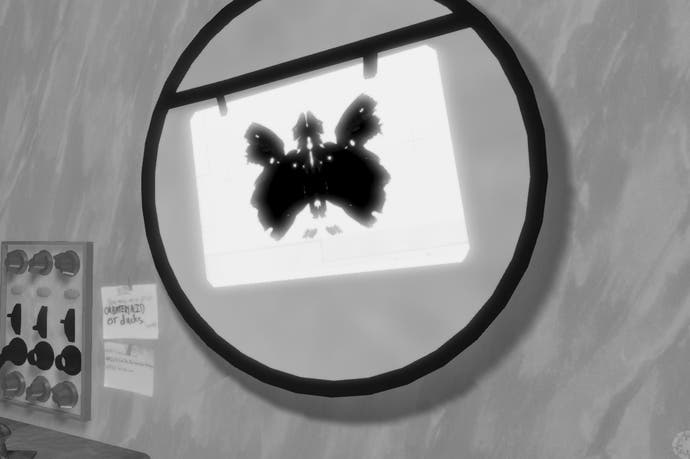Exploring Double Fine's Amnesia Fortnight 2014
Where were we?
Amnesia Fortnights are a bit of a tradition at Double Fine, and it's not hard to see why. They've helped the studio transition from the hazardous world of big budget blockbuster game development to the moderately less hazardous world of crafting compact, inventive digital titles. It's a way of spreading the risk, in essence - except it's a lot more entertaining than that makes it sound.
The idea's simple. Every year or so, the studio forgets what it's currently working on and divides into small teams. Each team then has two weeks to make a prototype for an entirely new game. Punters, meanwhile, have the option to buy into the process and play the completed prototypes. They can even vote to help decide what gets made in the first place.
All that's been taken care of for Amnesia Fortnight 2014, and there are now four games available to try out. If you ask me, a couple of them are pretty interesting, too. Let's take a quick look at the whole lot.
Steed
John Bernhelm with Double Fine
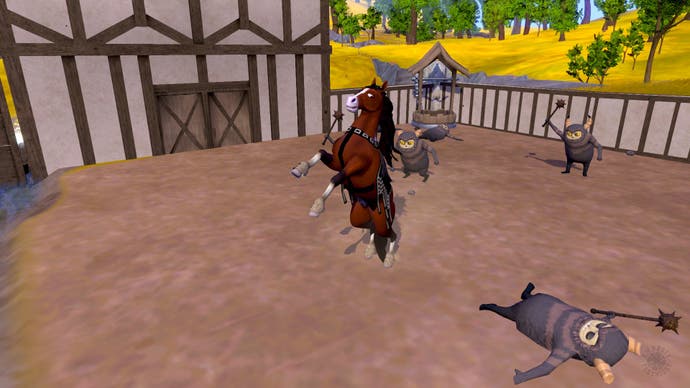
Steed's a hero-on-a-horse action adventure game with a twist - you're the horse rather than the hero. On paper this sounds brilliant and inventive. You can see why the whole thing sailed through the selection process so effortlessly. In reality, the current demo falls ever so slightly flat. It turns out that playing the horse feels pretty similar to playing the hero really - you just have a harder time turning around in small spaces.
Steed still opens beautifully, though, as you race over hills of golden grass with a chirpy little fellow bouncing around in the saddle. The art's wonderfully friendly and colourful, and although the playable area's fairly uninspiring, it's loaded with little easter eggs to uncover. There's a simple storyline to work through, and pretty soon you're attacking nasty Moblin-type folk with either your hind legs or your front legs and jostling your rider up and down so he'll fire off magic attacks. Within ten minutes, you'll have ridden around squishing enemies under a waterwheel and tackled a burning building, and that's pretty much it for Steed - as far as I can tell at least.
It's a pleasant distraction - and there are plenty of in-jokes to root out - but it feels like the design team will need to cook up some really brilliant twists if Steed's going to actually go anywhere special beyond its current incarnation. This is a relatively polished vertical slice, but it also seems distinctly hollow, and while a finished game would hopefully fix the rather limp combat and the occasionally indecisive camera - this all came together in two weeks after all - I've already got the lingering sense that the concept's the real problem. Which is why you make prototypes, I guess.
Dear Leader
Anna Kipnis with Double Fine
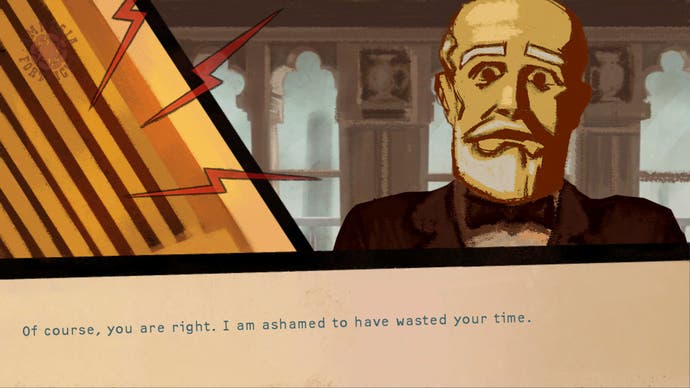
Inspired by Papers, Please and Cart Life, Dear Leader offers players a world of totalitarian paranoia and crushing busywork as seen from the top of the teetering pyramid rather than the bottom. You're the leader of a monolithic regime, and the game unfolds at your desk as you take calls from various ministers, decide on five-year-plans, select propaganda slogans and tackle threats, real and imagined, from within and without.
Again, the art's lovely, this time riffing on the heroic angles and rugged charcoal shading of classic Soviet poster design. The writing's typically characterful too, as you harass your ministers and jackboot your way from one crisis to the next. This is a game in which nobody ever tells you you're making the wrong decision, even when you clearly are, and where all of your most off-the-cuff edicts are met with yelps of terrified acclaim.
That said, Dear Leader never quite compensates for a lack of the awful bottom-of-the-heap pressure exerted by Papers, Please and Cart Life. These games put your very survival at stake from the start, and that leads to a wonderfully energised examination of the way that guiding philosophies, and their abuses, can impact the lives of ordinary people. You're certainly not free from worries in Dear Leader - if nothing else, there's possibly a nasty assassination plot brewing - but the game still doesn't have the same kind of immediacy to it. Your phone's constantly ringing, but it won't induce the jolting panic offered by folding newspapers, making change, or searching passports for tiny errors while the queue gets longer and longer.
That's fine, of course: the world doesn't need a Papers, Please clone, and it's laudable that Dear Leader seeks to offer a different perspective. The perspective it's chosen is not yet quite as engaging or as filled with potential nuance, however, and I suspect that's because of your role in proceedings. Lucas Pope and Richard Hofmeier were able show you how awful the systems they were exploring could be. To be in charge is to be removed, though, and while that's a neat point in itself, it also means that Dear Leader often feels like it's merely telling you about how bad things can get. The end result feels a bit like university civics coursework - well-intentioned and energetically handled, but frequently fairly obvious with it.
Mnemonic
Derek Brand with Double Fine
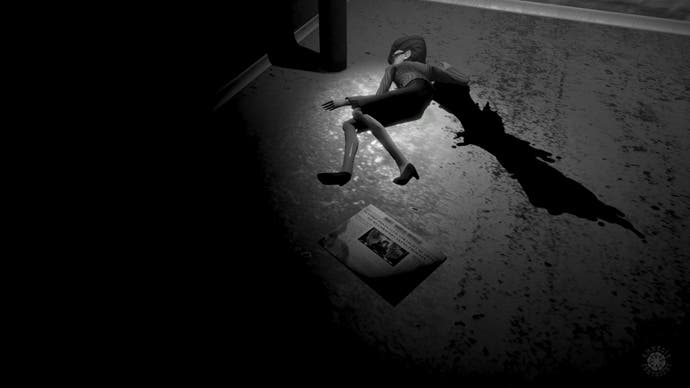
The Amnesia Fortnight starts to eat its own tail with Mnemonic, a 3D adventure game in which you play a film noir type who can't remember very much at all about the dead woman sprawled on the sidewalk at your feet. From this starkly lit crime-scene - an angular alleyway filled with shadows and shifting smoke - you work your way outwards, piecing together a story of betrayal, skullduggery and retro-futurist technology one madeleine at a time.
The central mechanical conceit is that you're allowed to replay any events that you can recall over and over again as you look for prompts to connect them to the next fragment of memory that's surely floating on the edge of your consciousness. You can also take certain artefacts from one memory and use them in another to peel back even more of the narrative. The inventory system as it's currently implemented is a little clumsy, and only one of the game's puzzles is truly stellar, but this is still a design that suggests a lot of potential when spread over a larger undertaking - and a larger undertaking set within this landscape is a tantalising thought.
That's because where Mnemonic really succeeds is in terms of atmosphere, its monochrome first-person set-up allowing you a vantage point onto a world that's equal parts Double Indemnity and Dark City. Memories are accessed through a series of doors set around a central hub, while scenes dissolve into Rorschach tests of fog as the main narrative slowly comes into focus. The smooth edges of early 1950s corporate chic are elegantly realised, while the teasing, suggestive storytelling is the perfect match for the chopped-up, stop-start world of the adventure game. Ambiguous yet never wasteful, Mnemonic is pretty much brimming with dark promise, and its pacing actually conjures a convincing sense of the protagonist thinking - of tumblers creaking back and forth before dropping into place.
Little Pink Best Buds
Pendleton Ward with Double Fine
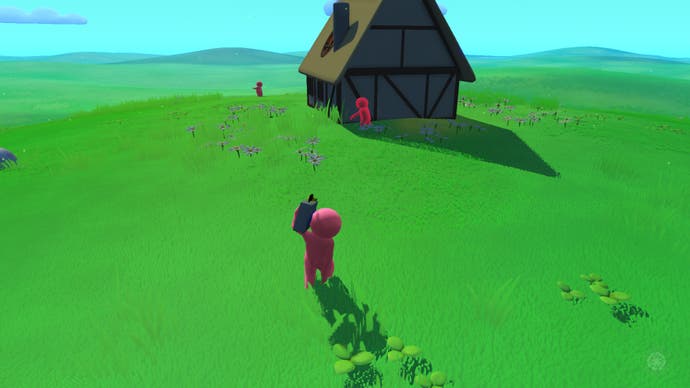
From the trunk of a car, you're deposited, via hockey-mask-clad weirdo, on a lovely green hillside under a clear blue sky. The weirdo departs, and you're left to wonder why Adventure Time creator Pendleton Ward's Double Fine prototype is called Little Pink Best Buds. Then the surroundings start to take root and you see that the grass is swarming with little pink guys. Some wear hats, some carry bicycles, some are tall and some are floating in the air. They all want to be your buds, though. They all want to be your best bud.
Ward's made a career of taking the cute and the strangely distressing and then squishing them together with peculiar force. He creates cupcakes covered with singing cockroaches, and that's what he's come up with here. To spoil too many of the details of Little Pink Best Buds would be to sap it of much of its power, but it's suffice to say that, while you can talk to your newfound acquaintances through a chat interface, this is ultimately a game concerned with the difficulties with communication. Equally, while everybody you meet wants to be your BFF, this isn't really a game about friendship.
At the moment, it's surprisingly linear too, since only one of the pink guys will lead you through to the tart and rather disconcerting conclusion, as far as I can tell. I wonder how a finished game would build on this, whether each potential bud would have their own potential narrative, and whether the whole thing would end up like The Stanley Parable, by way of Threadless.
That doesn't matter for now, though. Even in such a limited form, Little Pink Best Buds is the cream of the Amnesia Fortnight, whether it's down to the pudgy jelly-baby animation, the way the little guys fly through the air when you poke them, or the beat-perfect changes in tone as events escalate.
You'll struggle to shake off the memory of Pendleton Ward's prototype long after you've finished playing, in other words - and memories are ultimately what Amnesia Fortnights are all about.
